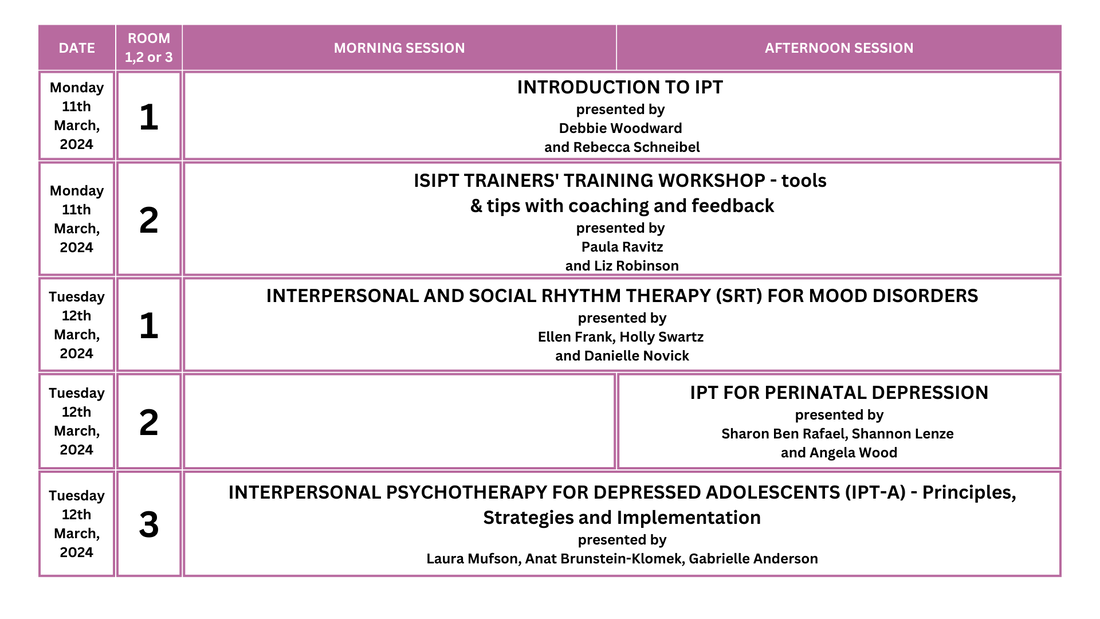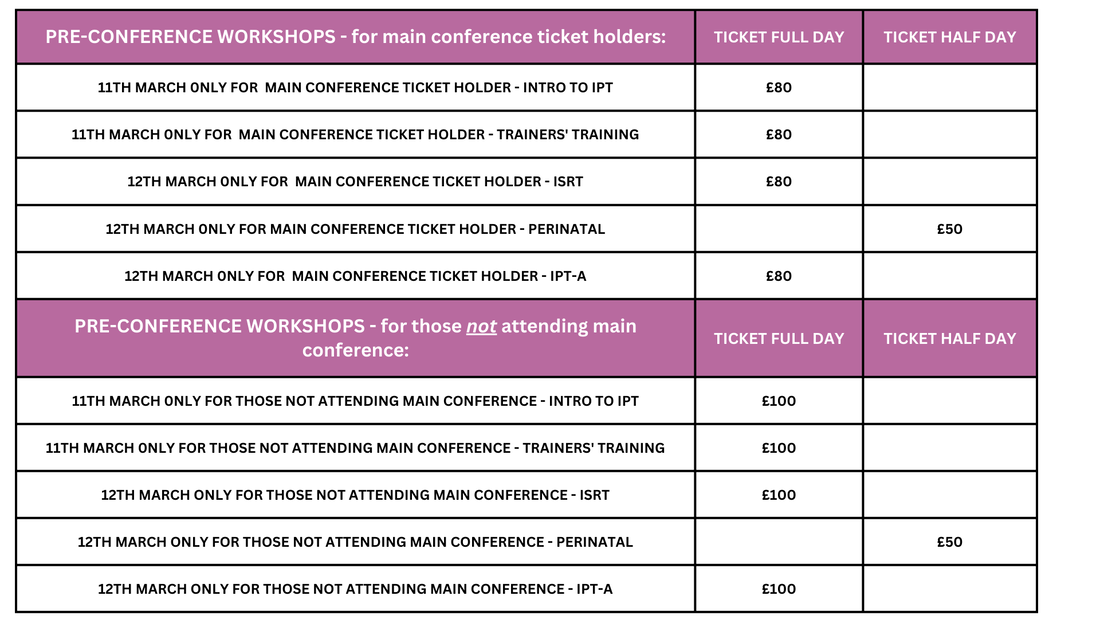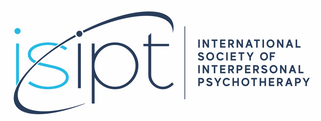The pre-conference workshops will be held at The Crowne Plaza Hotel, Newcastle on the two days preceding the 10th biennial conference of the International Society of Interpersonal Psychotherapy.
Tickets are £100 for one day or £160 for two days. If you are attending the conference the you only pay £80 for one day and £160 for two days. Please click here to book your place.
PLEASE NOTE THAT THESE WORKSHOPS ARE IN PERSON ONLY AND ARE NOT BEING STREAMED.
Please see programme below with full details underneath OR CLICK HERE - please note this may be subject to change.
Tickets are £100 for one day or £160 for two days. If you are attending the conference the you only pay £80 for one day and £160 for two days. Please click here to book your place.
PLEASE NOTE THAT THESE WORKSHOPS ARE IN PERSON ONLY AND ARE NOT BEING STREAMED.
Please see programme below with full details underneath OR CLICK HERE - please note this may be subject to change.
Details about the workshops:
Introduction to Interpersonal Psychotherapy (IPT)
Facilitators
Debbie Woodward DClinPsy
Dr. Rebecca Schneibel, psychological psychotherapist
Objectives
At the conclusion of this session the participant will have a good knowledge of:
Prerequisites
This workshop is an introduction to IPT and is aimed at people who have a previous psychological therapy training or a mental health professional qualification but no current substantial knowledge of IPT. Please note this workshop will not count toward accreditation within IPT UK or ISIPT but may pique your interest in going further! For some this workshop will help them get the most out of a second ISIPT Conference workshop, where they can then consider how IPT can be adapted and applied with a particular client group.
Abstract
This workshop will teach therapists how Interpersonal Psychotherapy developed and is applied as a treatment for depression with a strong evidence base across the age ranges and in diverse communities across the world. Interpersonal Psychotherapy is interested in what goes on between your client and their interpersonal world in terms of their significant life events and their relationships. It is a treatment that promotes the client’s understanding of their bio-psycho-social build up toward the development of depression and then pinpoints the main issue that keeps the depression going by helping the client identify an appropriate focal area. There are specific techniques used in IPT at the assessment, middle and end phase which allow the client to explore and make changes to their interpersonal world. IPT uses emotion as a mediator for change and promotes the clients effective use of their support network throughout treatment.
References
Facilitators
Debbie Woodward DClinPsy
Dr. Rebecca Schneibel, psychological psychotherapist
Objectives
At the conclusion of this session the participant will have a good knowledge of:
- the history of Interpersonal Psychotherapy and its key principles
- the three phases of IPT and potential focus areas
- IPT specific strategies and IPT focus area strategies
Prerequisites
This workshop is an introduction to IPT and is aimed at people who have a previous psychological therapy training or a mental health professional qualification but no current substantial knowledge of IPT. Please note this workshop will not count toward accreditation within IPT UK or ISIPT but may pique your interest in going further! For some this workshop will help them get the most out of a second ISIPT Conference workshop, where they can then consider how IPT can be adapted and applied with a particular client group.
Abstract
This workshop will teach therapists how Interpersonal Psychotherapy developed and is applied as a treatment for depression with a strong evidence base across the age ranges and in diverse communities across the world. Interpersonal Psychotherapy is interested in what goes on between your client and their interpersonal world in terms of their significant life events and their relationships. It is a treatment that promotes the client’s understanding of their bio-psycho-social build up toward the development of depression and then pinpoints the main issue that keeps the depression going by helping the client identify an appropriate focal area. There are specific techniques used in IPT at the assessment, middle and end phase which allow the client to explore and make changes to their interpersonal world. IPT uses emotion as a mediator for change and promotes the clients effective use of their support network throughout treatment.
References
- Weissman M. M.; Markowitz J. C.; Klerman G. L. (2017) The Guide to Interpersonal Psychotherapy: Updated and Expanded Edition. Oxford University Press.
- Gregoriadis, S. , Watson, P. Maunder, R. , Ravitz P. (2013) Psychotherapy Essentials to Go : Interpersonal Psychotherapy for Depression New York: Norton
- Howard, S. (2014) Interpersonal Therapy in W. Dryden and A. Reeves (eds) The Handbook of Individual Psychotherapy. London: Sage
- Markowitz, J. and Weissman, M. (eds.) (2012) Casebook of interpersonal psychotherapy. Oxford: Oxford University Press
- Weissman, M, Markowitz, J & Klerman, G (2007) A Clinicians quick guide to Interpersonal Psychotherapy Oxford university Press
ISIPT Trainers' Training Workshop
Facilitators
Paula Ravitz
Liz Robinson
This interactive, didactic, case-based ISIPT Trainers’ Training course provides tools and tips with coaching and feedback for a range of IPT trainers, from novice to experienced. Appropriate participants include individuals with prior knowledge of IPT and experience as an IPT supervisor of learners from community-based non-specialists to mental health specialist providers including in post-graduate education or accredited continuing education courses. There will be opportunity for knowledge exchange, mentorship, and practicing with coaching and feedback to advance your knowledge and skills as IPT trainers. Prior knowledge of IPT and prior experience as an IPT supervisor are required.
Having such a rich array of trainers is a fantastic opportunity to attend to learn from different perspectives.
Learning Objectives
At the end of this workshop, participants will be able to:
For individuals wishing to apply to become ISIPT-certified trainers (https://interpersonalpsychotherapy.org/trainer-certification/ ), in addition to attending this ISIPT IPT trainers training workshop, individuals must have led or co-led at least a total of 100 hours, combined, of IPT teaching in:
Facilitators
Paula Ravitz
Liz Robinson
This interactive, didactic, case-based ISIPT Trainers’ Training course provides tools and tips with coaching and feedback for a range of IPT trainers, from novice to experienced. Appropriate participants include individuals with prior knowledge of IPT and experience as an IPT supervisor of learners from community-based non-specialists to mental health specialist providers including in post-graduate education or accredited continuing education courses. There will be opportunity for knowledge exchange, mentorship, and practicing with coaching and feedback to advance your knowledge and skills as IPT trainers. Prior knowledge of IPT and prior experience as an IPT supervisor are required.
Having such a rich array of trainers is a fantastic opportunity to attend to learn from different perspectives.
- Dr Sue Luty- Psychiatrist, South Island Perinatal Mental Health Service, New Zealand
- Dr Joseph Chung- Vice President, IPT -China, Honorary Clinical Assistant Professor, The University of Hong Kong
- Dr Danielle Novick, PhD, Clinical Psychologist, Outpatient Behavioral Health Interdisciplinary Program, Psychology Supervisor, Veterans Affairs Medical Center Pittsburgh, Pennsylvania, USA
- Dr Anat Brunstein-Klomek- Anat Brunstein Klomek, Associate Prof, School of Psychology, Dean Reichman University, Israel
- Malin Back- Lic. Psychoterapist, PhD-student, IPT Trainer/supervisor, President of Swedish society of IPT, IPTS, Linköping University, Sweden
- Dr Nuno Carrilho- Psychiatrist, Depression outpatient, Aalborg University Hospital, Denmark
Learning Objectives
At the end of this workshop, participants will be able to:
- Organise an IPT training course, including setting forth learning objectives within a safe learning milieu, with slides, handouts/readings, pre-course assignments for in person and virtual learning.
- Present didactic elements of IPT-specific techniques and strategies with case illustrations.
- Facilitate interactive case-based discussion or practicing with learners and provide constructive feedback/guidance to transform learning to practice, e.g., on the teaching of the interpersonal inventory, choosing the focus/case formulation, communication analyses, clarification with affect attunement.
- Respond to or manage frequently encountered questions/challenges in IPT training.
For individuals wishing to apply to become ISIPT-certified trainers (https://interpersonalpsychotherapy.org/trainer-certification/ ), in addition to attending this ISIPT IPT trainers training workshop, individuals must have led or co-led at least a total of 100 hours, combined, of IPT teaching in:
- clinical IPT training workshops (introductory, intermediate or advanced levels) and/or
- IPT academic course(s) (e.g., undergrad or post-grad teaching) and/or
- IPT research, training research therapists for a study
Interpersonal and Social Rhythm Therapy (SRT) for Mood Disorders
Faculty
Ellen Frank, Ph.D.
Danielle Novick, Ph.D.
Holly A. Swartz, M.D.
OBJECTIVES
At the conclusion of this session the participant will be able to:
Abstract: This workshop will teach therapists the basics of Interpersonal and Social Rhythm Therapy (IPSRT) for mood disorders, with an emphasis on its application to the management of bipolar disorder. IPSRT is considered an adaptation of IPT. Social Rhythm Therapy (SRT), a behavioural intervention designed to address regularity of daily routines (social rhythms), is added to the IPT framework. IPSRT also incorporates a fifth IPT problem area, grief for the lost healthy self, to help individuals cope with having a chronic medical condition.
The premise of SRT rests on research showing that individuals with mood disorders have underlying disturbances in their circadian biology as well as evidence showing that circadian rhythms can be modified by external factors. The rising and setting of the sun is a critically important external cue affecting the timing of biologic clocks. However, our body clocks also rely on social cues for help with timing, such as going to work at specific times, getting up at the same time every morning to take children to school, and having meals with friends or family at the same time every day. These social factors that help to set or entrain biologic clocks are known as social rhythms. Mood episodes are associated with disruptions in social and circadian rhythms whereas stable rhythms are associated with stable mood. IPSRT helps individuals stabilize their social rhythms to promote circadian stability, thereby improving mood.
This workshop will consist of an introduction to IPSRT. It will cover the theoretical rationale for IPSRT, including the importance of circadian rhythms in mood disorders. Participants will learn strategies for managing the “grief for the lost healthy self” problem area, including mourning the loss of the old role and developing more effective strategies to adapt to the new role. Participants will learn how to use the Social Rhythm Metric (SRM) to monitor and modify circadian rhythms and strategies to optimize regularity of the sleep-wake cycle. Interactive role plays will provide opportunities to learn and practice new skills.
References
Faculty
Ellen Frank, Ph.D.
Danielle Novick, Ph.D.
Holly A. Swartz, M.D.
OBJECTIVES
At the conclusion of this session the participant will be able to:
- Identify the links among interpersonal events, social rhythms, and mood
- Implement strategies that can be used to improve the social rhythm stability of individuals with mood disorders
- Monitor social rhythms using the Social Rhythm Metric
Abstract: This workshop will teach therapists the basics of Interpersonal and Social Rhythm Therapy (IPSRT) for mood disorders, with an emphasis on its application to the management of bipolar disorder. IPSRT is considered an adaptation of IPT. Social Rhythm Therapy (SRT), a behavioural intervention designed to address regularity of daily routines (social rhythms), is added to the IPT framework. IPSRT also incorporates a fifth IPT problem area, grief for the lost healthy self, to help individuals cope with having a chronic medical condition.
The premise of SRT rests on research showing that individuals with mood disorders have underlying disturbances in their circadian biology as well as evidence showing that circadian rhythms can be modified by external factors. The rising and setting of the sun is a critically important external cue affecting the timing of biologic clocks. However, our body clocks also rely on social cues for help with timing, such as going to work at specific times, getting up at the same time every morning to take children to school, and having meals with friends or family at the same time every day. These social factors that help to set or entrain biologic clocks are known as social rhythms. Mood episodes are associated with disruptions in social and circadian rhythms whereas stable rhythms are associated with stable mood. IPSRT helps individuals stabilize their social rhythms to promote circadian stability, thereby improving mood.
This workshop will consist of an introduction to IPSRT. It will cover the theoretical rationale for IPSRT, including the importance of circadian rhythms in mood disorders. Participants will learn strategies for managing the “grief for the lost healthy self” problem area, including mourning the loss of the old role and developing more effective strategies to adapt to the new role. Participants will learn how to use the Social Rhythm Metric (SRM) to monitor and modify circadian rhythms and strategies to optimize regularity of the sleep-wake cycle. Interactive role plays will provide opportunities to learn and practice new skills.
References
- Frank E. Treating bipolar disorder: A clinician's guide to interpersonal and social rhythm therapy. New York, NY, Guilford Press; 2005.
- Frank E, Kupfer DJ, Thase ME, Mallinger AG, Swartz HA, Fagiolini AM, Grochocinski V, Houck P, Scott J, Thompson W, Monk T. Two-year outcomes for interpersonal and social rhythm therapy in individuals with bipolar I disorder. Arch Gen Psychiatry. 2005;62:996-1004
- Swartz HA, Rollman BL, Mohr DC, Sadow S, Frank E. A randomized pilot study of Rhythms And You (RAY): An internet-based program for bipolar disorder administered with and without clinical helper support in primary care. J Affect Disord. 2021 Dec 1;295:183-191; PMCID: PMC8551063.
- Swartz HA. Social rhythm therapy workbook for bipolar disorder: Stabilize your circadian rhythms to reduce stress, manage moods, and prevent future episodes. Oakland, CA: New Harbinger Publications, Inc., 2024
Bringing a Perinatal Frame of Mind to IPT Practice
Half day workshop with:
- Shannon Lenze, PhD, Associate Professor of Psychiatry, Washington University School of Medicine
- Sharon Ben Rafael, PsyD, director of the Israeli IPT Program and Adjunct faculty, Bria Women's Mental Health, Sackler School of Medicine, Tel Aviv University
- Angela Wood, Psychological Therapist, Specialist Perinatal Mental Health Team, Greater Manchester Mental Health Foundation NHS Trust
The Perinatal Period is a time of immense change when expectant and new parents face greater challenges to their psychological wellbeing; antenatal and post-natal mental health problems can therefore be a common feature of someone’s journey to parenthood. Interpersonal Therapy is developing a strong evidence base to support the mental health of expectant / new parents and their infants.
This workshop will offer an introduction to the perinatal frame of mind and support attendees to step back and review the landscape of change facing expectant / new parents and their infants. Attendees will then be guided through the PBBS (Psychological, Biological, Behavioral, Social) clinical formulation to thoughtfully consider issues of transgenerational transmission (through concepts of "ghosts in the nursery" and "angels in the nursery"), attachment and mentalization; as well as the complexities which may arise for someone’s psychological wellbeing during the many changes that occur during the perinatal period, and how to consider these complexities when formulating in IPT.
Time will also be given to hold these ideas in mind whilst practising some core IPT strategies within small groups.
Through attending this workshop, attendees will be able to:
- Develop a greater understanding of the complex change facing perinatal clients and their infants.
- Have new ways to formulate in IPT whilst holding this complex change in mind.
- Keep baby in mind whilst working with their parent.
- Practise core IPT strategies whilst holding a perinatal frame of mind.
Interpersonal Psychotherapy for Depressed Adolescents (IPT-A): Principles, Strategies, and Implementation
Workshop with:
Chair:
Laura Mufson, Ph.D.
Viola W. Bernard Professor of Medical Psychology
Columbia University, Vagelos College of Physicians and Surgeons
Research Scientist, New York State Psychiatric Institute
[email protected]
Co-Presenters:
Anat Brunstein Klomek, Ph.D.
Associate Professor
School of Psychology, Reichman University, Israel
[email protected]
Gabrielle Anderson, Ph.D.
Clinical Professor, University of California, San Francisco
Clinical Director, Hallowell Todaro ADHD Center
[email protected]
Laura Mufson, PhD., is the Viola W. Bernard Professor of Medical Child Psychology (in Psychiatry) and Associate Director of the Division of Child & Adolescent Psychiatry at Columbia University Irving Medical Center (CUIMC), and Director of Clinical Psychology at New York State Psychiatric Institute. She is the developer of the adolescent adaptation of IPT and has been conducting studies of the efficacy and effectiveness of IPT-A and its adaptations for over 30 years.
Anat Brunstein Klomek, PhD., is the Dean of the School of Psychology at Reichman University in Israel. She is a clinical psychologist and an Adjunct Associate Research Scientist in the Division of Child and Adolescent Psychiatry at Columbia University/New York State Psychiatric Institute (NYSPI). She is one of the developers of IPT-A Ultra Short Crisis Intervention (IPT-A SCI).
Gabrielle Anderson, PhD., is the Clinical Director of the Hallowell Todaro Center in California and a Full Clinical Professor in the Department of Psychiatry and Behavioral Sciences at the UCSF Weill Institute for Neurosciences. Over the past two decades she has served as a supervisor and trainer for various studies and training programs for IPT-A, IPT-AST and IPT with therapists all around the world.
.
Objectives
At the conclusion of this session the participant will have a good knowledge of:
Prerequisites
This workshop is aimed at people who have some previous knowledge of IPT but may not necessarily have had training in the adolescent model. This workshop will provide a brief refresher on the basic principles and strategies of IPT and how the treatment is adapted for adolescents with depression. The main goal of the workshop is to provide an opportunity to see more demonstrations, participate in case discussions, practice skills, and focus on more complex cases.
Interpersonal Psychotherapy for Depressed Adolescents (IPT-A) was adapted from the adult model of IPT and is based on the premise that depression, regardless of its etiology, occurs in an interpersonal context. IPT-A is a 12-15 session (12-16 weeks) treatment that focuses on improving depressive symptoms and interpersonal functioning. This workshop will present the goals and phases of IPT-A, identified problem areas, primary components of IPT-A, with emphasis on specific therapeutic techniques and implementation in community settings and with more complex presentations. The course will also provide an opportunity to focus on several issues in delivering IPT-A: 1) involvement of parents and social media in treatment, 2) managing suicidal ideation and safety planning within the IPT-A model; and 3) implementation in diverse settings. Lastly, we will discuss the use IPT-A as delivered over telehealth platforms. The course will include didactics, use of clinical case examples and opportunity for short experiential role playing.
References:
Workshop with:
Chair:
Laura Mufson, Ph.D.
Viola W. Bernard Professor of Medical Psychology
Columbia University, Vagelos College of Physicians and Surgeons
Research Scientist, New York State Psychiatric Institute
[email protected]
Co-Presenters:
Anat Brunstein Klomek, Ph.D.
Associate Professor
School of Psychology, Reichman University, Israel
[email protected]
Gabrielle Anderson, Ph.D.
Clinical Professor, University of California, San Francisco
Clinical Director, Hallowell Todaro ADHD Center
[email protected]
Laura Mufson, PhD., is the Viola W. Bernard Professor of Medical Child Psychology (in Psychiatry) and Associate Director of the Division of Child & Adolescent Psychiatry at Columbia University Irving Medical Center (CUIMC), and Director of Clinical Psychology at New York State Psychiatric Institute. She is the developer of the adolescent adaptation of IPT and has been conducting studies of the efficacy and effectiveness of IPT-A and its adaptations for over 30 years.
Anat Brunstein Klomek, PhD., is the Dean of the School of Psychology at Reichman University in Israel. She is a clinical psychologist and an Adjunct Associate Research Scientist in the Division of Child and Adolescent Psychiatry at Columbia University/New York State Psychiatric Institute (NYSPI). She is one of the developers of IPT-A Ultra Short Crisis Intervention (IPT-A SCI).
Gabrielle Anderson, PhD., is the Clinical Director of the Hallowell Todaro Center in California and a Full Clinical Professor in the Department of Psychiatry and Behavioral Sciences at the UCSF Weill Institute for Neurosciences. Over the past two decades she has served as a supervisor and trainer for various studies and training programs for IPT-A, IPT-AST and IPT with therapists all around the world.
.
Objectives
At the conclusion of this session the participant will have a good knowledge of:
- the basic principles and strategies for treating adolescents with IPT-A.
- how to work with parents/families within the IPT-A model.
- how to manage clinical complexities such as suicidal ideation while implementing techniques in diverse clinical settings
Prerequisites
This workshop is aimed at people who have some previous knowledge of IPT but may not necessarily have had training in the adolescent model. This workshop will provide a brief refresher on the basic principles and strategies of IPT and how the treatment is adapted for adolescents with depression. The main goal of the workshop is to provide an opportunity to see more demonstrations, participate in case discussions, practice skills, and focus on more complex cases.
Interpersonal Psychotherapy for Depressed Adolescents (IPT-A) was adapted from the adult model of IPT and is based on the premise that depression, regardless of its etiology, occurs in an interpersonal context. IPT-A is a 12-15 session (12-16 weeks) treatment that focuses on improving depressive symptoms and interpersonal functioning. This workshop will present the goals and phases of IPT-A, identified problem areas, primary components of IPT-A, with emphasis on specific therapeutic techniques and implementation in community settings and with more complex presentations. The course will also provide an opportunity to focus on several issues in delivering IPT-A: 1) involvement of parents and social media in treatment, 2) managing suicidal ideation and safety planning within the IPT-A model; and 3) implementation in diverse settings. Lastly, we will discuss the use IPT-A as delivered over telehealth platforms. The course will include didactics, use of clinical case examples and opportunity for short experiential role playing.
References:
- Mufson L. Dorta KP, Moreau D, Weissman MM. Interpersonal Psychotherapy for Depressed Adolescents, second edition. Guilford Publications, Inc.: New York, 2004.
- Haruvi Catalan, L., Levis Frenk, M., Adini Spigelman, E., Engelberg, Y., Barzilay, S.,Mufson, L., Apter, A., Benaroya Milshtein, N., Fennig, S., Brunstein Klomek, A. Ultra - Brief Crisis IPT-A based Intervention for Suicidal Children and Adolescents (IPT-A-SCI) Pilot study results. Frontiers in Psychiatry 2020 Dec 9; 11:553422. doi: 10.3389/fpsyt.2020.553422. eCollection 2020.PMID: 33362595
- Gunlicks-Stoessel, M., & Mufson, L. Interpersonal Psychotherapy for Depressed Adolescents, In Dulcan M.K. (ed.) The Textbook of Child and Adolescent Psychiatry, 3rd edition, American Psychiatric Publishing, Washington, D.C., 2021, 959-971.
- Mufson, L., Rynn, M., Yanes-Lukin, P., Choo, T.H., Soren, K., Stewart, E., Wall, M. Stepped Care Interpersonal Psychotherapy Treatment for Depressed Adolescents: A Pilot Study in Pediatric Clinics. Administration and Policy in Mental Health and Mental Health Services Research. 2018; 45(3) 417–431; PMID 29124527.
- Mufson L. Interpersonal Psychotherapy for Depressed Adolescents (IPT-A): Extending the reach from academic to community settings. Child and Adolescent Mental Health, 2010,15(2), 66-72.
- Mufson L, Dorta KP, Wickramaratne P, Nomura Y, Olfson M, Weissman MM. A Randomized Effectiveness Trial of Interpersonal Psychotherapy for Depressed Adolescents. Archives of General Psychiatry.2004, 61:577-584.
TICKET PRICES - click to register - PLEASE BUY SPECIFIC SESSION TICKETS as specified on ticket website



